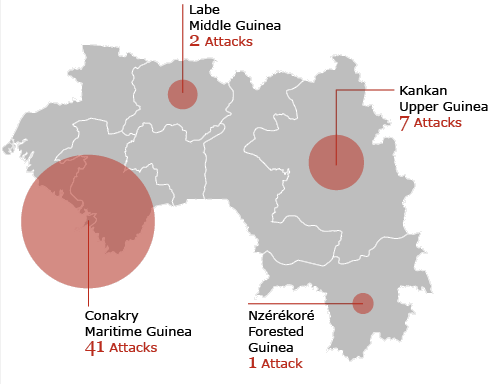Anti-press attacks increased in Guinea in 2013 amid political unrest and inter-ethnic clashes in the run-up to the country’s long-delayed legislative elections. The voting was finally held on September 28 and won by President Alpha Condé’s party. Journalists were threatened and assaulted while covering pre-election activities, with some saying the assailants were security forces or political party supporters. Journalists were caught up in tension between supporters of Condé, mostly of the Malinke ethnicity, and opposition militants of the mainly Peul ethnicity. Some journalists were also accused of being spies for political parties. Government officials and security forces supportive of Condé shut down radio stations, suspended and detained their staff, and barred journalists from reporting on Condé’s pre-election campaign tour. Though many journalists have been attacked in Guinea over the years, CPJ research shows that not one perpetrator of an anti-press attack has been held responsible since 2008.
Guinea
» Journalists attacked while covering lead-up to elections.
» Impunity on the rise as anti-press attacks go unpunished.
Anti-press attacks increased in Guinea in 2013 amid political unrest and inter-ethnic clashes in the run-up to the country’s long-delayed legislative elections. The voting was finally held on September 28 and won by President Alpha Condé’s party. Journalists were threatened and assaulted while covering pre-election activities, with some saying the assailants were security forces or political party supporters. Journalists were caught up in tension between supporters of Condé, mostly of the Malinke ethnicity, and opposition militants of the mainly Peul ethnicity. Some journalists were also accused of being spies for political parties. Government officials and security forces supportive of Condé shut down radio stations, suspended and detained their staff, and barred journalists from reporting on Condé’s pre-election campaign tour. Though many journalists have been attacked in Guinea over the years, CPJ research shows that not one perpetrator of an anti-press attack has been held responsible since 2008.
-
51
Anti-press attacks -
41%
Attacks by security forces, government -
0
Attackers held responsible -
8
Attacks on station
CPJ documented at least 51 attacks against journalists in 2013. Most occurred in the capital, Conakry.

Security forces and government officials were believed responsible for 21 of the 51 attacks on the press documented by CPJ. Other attacks came from supporters of the ruling party as well as supporters of opposition political parties, CPJ found.
| 21 | Security forces, government |
| 8 | Militants of the opposition Union of Democratic Forces of Guinea political party |
| 6 | Supporters of the ruling Rally of the Guinean People |
| 16 | Others (non-partisan civilians and unidentified assailants) |
No one has been brought to justice in any of the attacks that CPJ has documented over the past five years.
Radio station Planète FM, which is owned by vocal opposition leader Abubacarr Sylla, was attacked, censored, or harassed on at least eight occasions in 2013, according to CPJ research.
March 1, 2013: | An unidentified gunman fires a bullet into the offices of Planète FM during a visit by an opposition leader to the station. |
March 2013: | Chérie FM director Chantal Colle sues Mandian Sidibe, director of Planète FM, for defamation, insult, racism, and ethnocentrism in connection with on-air comments criticizing Chérie FM for firing 26 journalists, news reports said. Espace FM journalist Aboubacar Diallo and David Youmbouno, one of the fired journalists, are also sued. In May, a court rules Sidibe must pay Colle a fine of 500,000 Guinean francs (US$71) and symbolic damages of 1 franc, according to news reports. The court dismisses the claims against Diallo and Youmbouno. |
April 18, 2013: | Police fire live bullets into Planète FM studios in apparent retaliation for the station's coverage of a police crackdown on protesters, according to the Ghana-based Media Foundation for West Africa (MFWA). |
May 25, 2013: | Planète FM reports that its 106.3 FM radio frequency has been jammed. The station says the reason is unclear. |
May 30, 2013: | Five days later, the state-run National Communications Council hands a one-month broadcasting suspension to Planète FM and bars Mandian Sidibe, the station's director, from the airwaves for a month for inciting hate and violence. The CNC does not offer any evidence for its allegations. |
July 4, 2013: | Mandian Sidibe is charged with libel for comments he made during a radio broadcast, MFWA reports. Sidibe's lawyer says he will appeal the indictment. An appeal was pending by late year. |
November 17, 2013: | Mandian Sidibe announces live on Planète FM that unidentified assailants are at the radio station to assassinate him, according to news reports. At least one individual is killed and several are injured during ensuing clashes between the police and protesters who mobilized to protect Sidibe. |
November 22, 2013: | The National Communications Council bars Mandian Sidibe from performing any journalistic work for 45 days, saying he had failed to prove that there was an assassination attempt on his life. |
